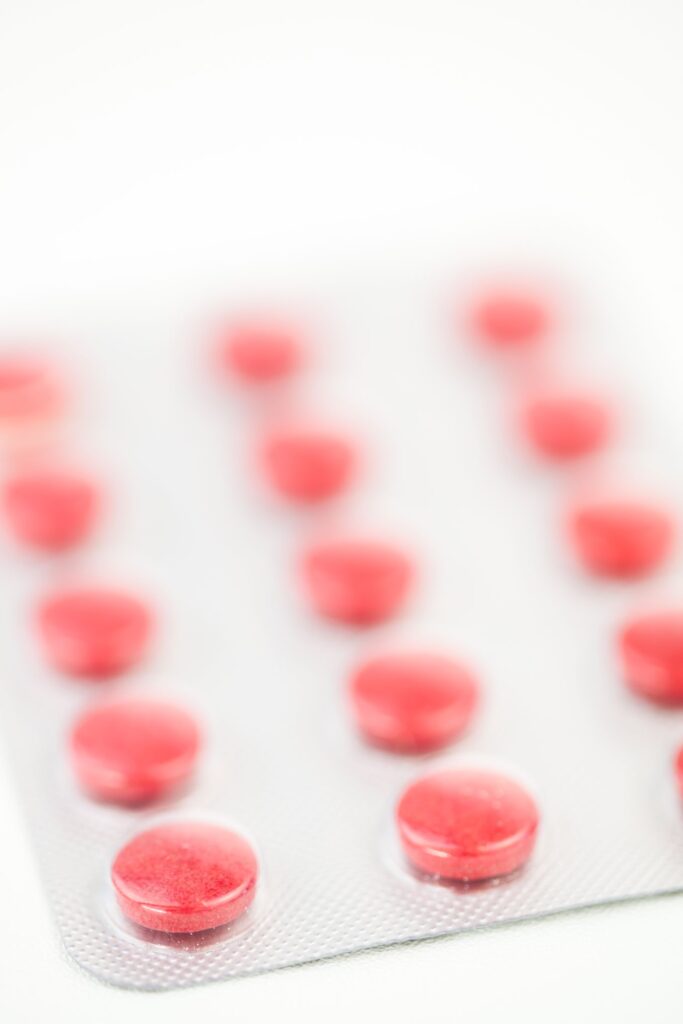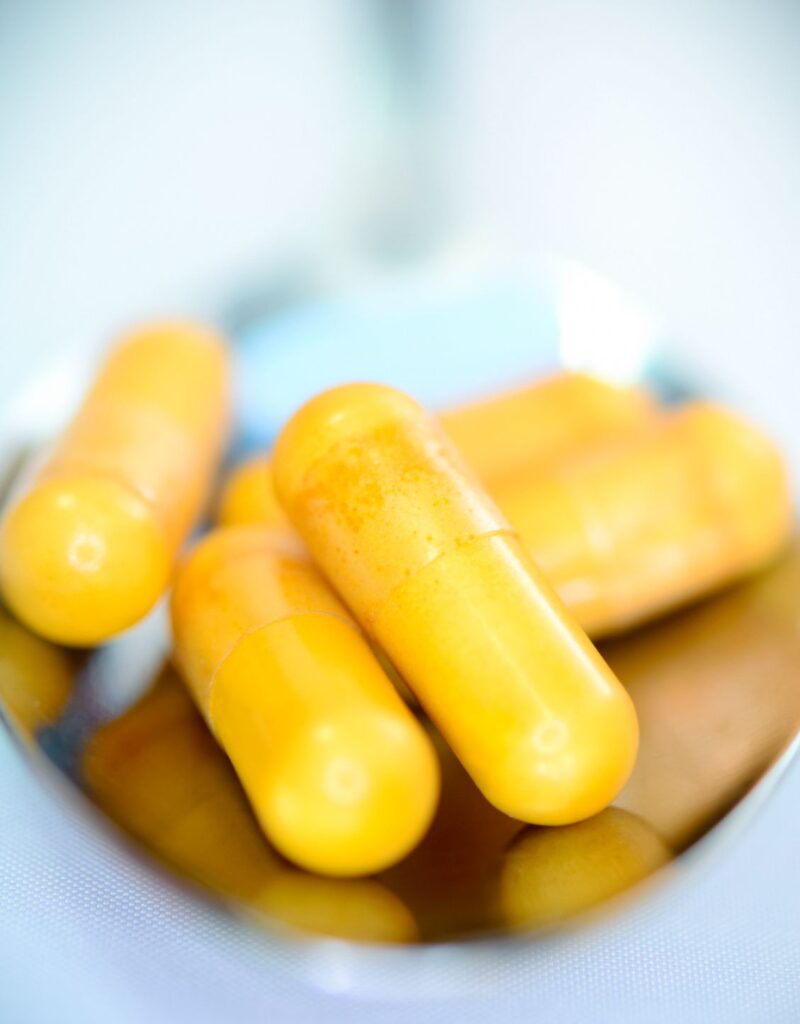This article may contain compensated links. Please read Disclaimer for more info. As an Amazon Associate, I earn from qualifying purchases.
Messed-up mitochondria can mess with your mind.
Sounds a bit far off? Well, it’s true.
Most likely, you’ll know how diabetes, stroke, heart disease, and other metabolic issues are related to your cell and mitochondrial health.
However, science has only recently begun thoroughly exploring the relationship between those tiny cell powerhouses and mental health.
The results are encouraging for a number of reasons.
Not only are there numerous lifestyle practices that you can use to support your mitochondrial (and mental) health. You can incorporate quite a list of the best supplements for mitochondria into your daily routine as well.
Keep reading to find the right ones for you and improve your health significantly.
Jump directly to the best mitochondrial supplements.
Double-Edged Sword: The Case of Psychotropic Medication
Have you ever tried psychotropic medication? Such as antidepressants or antipsychotics? For conditions like depression, bipolar disorder, OCD, or schizophrenia?
Or perhaps your doctor or psychiatrist recommended taking some, but the lengthy list of possible complications put you off.
I can vouch for that; believe me.
The side effects of psychotropic drugs can leave you in shock and awe.
Most of them have a laundry list of side effects that make your metabolism go haywire. We’re talking about potential weight gain, appetite changes, and even messing with your blood sugar and cholesterol levels. Not good to support healthy mitochondria.
The problem is, we’re stuck in a classic chicken or egg situation when it comes to mental health.
The most recent research suggests that dysfunctional mitochondria and a wonky metabolism are the root causes of psychiatric disorders.
Consequently, relying solely on antidepressants is at best a temporary solution because they may help stabilize the chemistry of your brain. They also disrupt your mitochondria and, once more, worsen your mental health at the same time.
It’s like trying to put out a fire with gasoline. Temporary relief, but not sustainable.
It is pure logic, then, to primarily address the underlying mitochondrial and metabolic issues to find a more effective and lasting solution to mental health issues.



The Alternative Route: Mind Your Mitochondria for Mental Health
Not to misunderstand: Depending on your specific case, it may be absolutely necessary for you to take these psychotropic medications.
They can be a lifeline, helping you manage your health and find stability. And there might be no way to substitute them with even the best mitochondrial support supplement.
So don’t toss them out the window just yet.
But if your condition allows and you’re open to exploring alternatives, there are intriguing options to consider—lifestyle changes and supplements that focus on mitochondrial health.
Here’s a quick run through the top lifestyle strategies on how to improve mitochondrial health for a better mental state:
Eat Like a Mitochondrial Boss
Give those powerhouses the fuel they deserve with an ideal mitochondria diet. Load up on nutrient-dense foods like colorful fruits and veggies, lean proteins, and healthy fats.
And take care of your lysine levels by eating poultry, beef), fish, eggs, and dairy. The essential amino acid lysine plays a crucial role in protein synthesis and cellular function, including within our mighty mitochondria. Eating for your mitochondria will make a difference, you’ll feel it.

Get Your Sweat On
Exercise isn’t just for toning that skeletal muscle; it’s a mitochondria party! Get moving and watch those cellular powerhouses thrive. Aim for a mix of cardio, intensity interval training (HIIT), regular walks, and maybe even a dance party in your living room. Your mitochondria will thank you.

Sleep Like a Sloth
Restful slumber is like a spa day for your mitochondria. Prioritize your sleep and give those energy factories the chance to repair and recharge. Create a cozy slumber sanctuary and snooze like a champion.

Embrace Intermittent Fasting
Give your mitochondria a break from constant snacking. Intermittent fasting can help reset your energy metabolism and give those little powerhouses a chance to do their thing. Just remember to stay hydrated and listen to your body’s hunger cues. And talk to your doctor before diving in—intermittent fasting isn’t for everyone.

Chill Out and Destress
How to strengthen mitochondria directly related to stress. Stress is the mitochondria’s archenemy. When stress creeps in, it messes with their mojo, triggering the release of Reactive Oxygen Species (ROS) and unleashing oxidative stress that can mess with your mental well-being. So, it’s important to manage stress and give our mitochondria some extra support for a happier, healthier mind.
Reactive oxygen species (ROS) are like little troublemakers produced in mitochondria during normal cell processes. When these troublemakers go overboard, they cause oxidative stress, messing with cellular function. This oxidative stress has been linked to mental health concerns.

Fuel up With Antioxidants
Those pesky free radicals can wreak havoc on your mitochondria. Fight back with antioxidant-rich foods like berries, some dark chocolate, and green tea. It’s like giving your powerhouses a shield to defend against the bad guys.

Supplement Smartly
Ah, the world of supplements. It’s like a treasure hunt for the perfect boost to support your mitochondria. But hold your horses before you go all gung-ho in the supplement aisle.
First, try to get as many nutrients as possible through a healthy mitochondria repair diet, e.g. with oily fish, avocados, coconut oil, olive oil, and flaxseed oil.
And then, since these little mitochondrial supplements can pack a punch, it’s crucial to consult with your healthcare provider first. They’ll make sure there are no clashes with other meds and help you find the perfect fit for your condition.
Here are a few explanations for why it makes sense to use a mitochondrial supplement.

Nourish Your Mind with Mitochondria-Boosting Supplements
Mitochondria produce energy in your brain cells, cranking out ATP (adenosine triphosphate) to fuel your cellular energy needs. Your brain has a higher concentration of these cellular powerplants than anywhere else in your body.
They provide energy for your senses, heartbeats, sex drive, and even your brilliant thoughts.
Now, here’s the kicker: mitochondria need your help.
It’s surprisingly easy to harm these tiny powerhouses since they lack the DNA protection and repair systems found in other cells. And a couple of medications, including antibiotics, are their arch-nemesis. Those drugs can wreak havoc on your brain cell’s mitochondria.
And it’s not just the prescriptions your doctor gives you—livestock are pumped with loads of antibiotics, exposing us to these mitochondria-damaging substances daily.
When your mitochondria start to deplete or weaken, your energy takes a nosedive. It’s no wonder mitochondrial dysfunction has been linked to conditions like schizophrenia, bipolar disorder, depression, dementia, Parkinson’s disease, stroke, and chronic fatigue syndrome.
Given the pivotal role mitochondria play in our well-being, supporting them should be at the top of your health-priority list.
The Best Supplements to Boost Mitochondria and Mental Health
Let’s dive into 18 mitochondria supplements that have the potential to level up your mental health.
These selected micronutrients go beyond just supporting your mitochondria—they’re natural nootropics for boosting your mind and mood. With their cognitive-enhancing properties, they’ll supercharge your brain, sharpen your focus, enhance your memory, and give you a mental edge like never before.
Coenzyme Q10
Coenzyme Q10 (CoQ10) is a compound that’s naturally found in every single cell of your body.
It’s key when it comes to making energy in the mitochondria. CoQ10 acts as a coenzyme, which means it teams up with enzymes to make important things happen in your body.
CoQ10 is like an electron enthusiast, accepting and giving away electrons to create chain reactions that power up your cells.
It plays a vital role in this energy-producing process by shuttling electrons and helping the mitochondrial respiratory chain do its job with finesse. When it accepts an electron, it becomes Ubiquinol. And when it gives away an electron, it goes back to being Ubiquinone. This balance is crucial for your body to get all the benefits from CoQ10.
CoQ10 helps with a range of important processes:
- Boosts mental energy: By making sure your mitochondria are working like a charm, CoQ10 gives your overall energy levels a big boost. That means you can think clearly, focus better, and stay alert. It’s also a key player in the electron transport chain, which is like a series of reactions that make energy in the form of adenosine triphosphate (ATP).
- Keeps free radicals in check: CoQ10 can reduce oxidative stress. It protects your mitochondria and brain cells from damage caused by free radical production. That’s how it helps keep your brain healthy for the long run.
- Helps make neurotransmitters: CoQ10 lends a helping hand in making neurotransmitters, which are super important for keeping your mood balanced, your cognitive function sharp, and your overall mental well-being in check.
- Boosts your mood: Research suggests that taking CoQ10 supplements helps with symptoms of depression, anxiety, and other mood disorders. So it could be just the thing to bring some emotional balance to your life.
- Supports your brainpower: CoQ10 has shown some promise in supporting cognitive function and memory. So if you’re experiencing a decline in brainpower or memory issues that come with getting older, CoQ10 might just be your secret weapon.
- Protects your brain cells: CoQ10 has the ability to protect your brain cells from damage and degeneration. That’s key because it could help prevent neurodegenerative disorders from messing with your brain.
- Gives power to your organs: CoQ10 isn’t just about overall energy production in your body. It’s also super crucial for organs that need a lot of energy, like your heart, brain, and muscles. It keeps your heart pumping strong, boosts your brainpower, and helps your organs function at their best.
While your body naturally produces CoQ10, its levels can decline with age or due to certain health conditions. Taking CoQ10 supplements can help replenish and support optimal levels, promoting overall health and well-being.
To get the most out of this mitochondria supplement, it’s recommended to take a daily dosage of 200 – 400 mg. You might also find that the Ubiquinol version of CoQ10 suits you better, giving you an extra edge on your journey to energize yourself.
Acetyl-L-Carnitine
Acetyl-L-Carnitine (ALCAR) is a powerful ally for your mitochondria and a potent nootropic supplement.
As you age, your carnitine levels drop, and you might not be getting enough of this mighty amino acid from your diet alone. But fear not, because studies show that supplementing with ALCAR can jumpstart your sluggish mitochondria and even reverse age-related or toxic-induced damage. It provides several benefits:
- Energy Production: ALCAR helps transport fatty acids into the mitochondria, where they are converted into ATP (adenosine triphosphate), the cellular fuel that powers your body and mind.
- Mitochondrial Protection: ALCAR acts as a defender, shielding mitochondria from harmful waste and toxins that can damage their structure and function.
- Mitochondrial Regeneration: ALCAR supports the growth of new mitochondria, a process known as mitochondrial biogenesis. This helps replenish and strengthen these cellular powerhouses.
- Age-Related Support: As we age, mitochondrial function can decline. ALCAR supplementation can help counteract this decline, boosting mitochondrial efficiency and reversing age-related damage.
- Brain Health: The brain relies heavily on mitochondria for energy. ALCAR’s ability to improve mitochondrial function can positively impact cognitive health, improving memory, focus, and overall brain performance.
- Mental Health: ALCAR’s ability to optimize mitochondrial function plays a crucial role in promoting mental health. By enhancing energy production and supporting efficient brain cell activity, it can have a positive impact on your mood, cognitive function, and overall mental performance.
Research suggests that supplementing with ALCAR helps improve mood, reduce fatigue, and alleviate memory problems. It has been shown to support neurotransmitter function, which influences mood regulation and cognitive processes.
Therefore, by supporting mitochondrial health and function, carnitine supplementation ensures efficient energy production, protects against damage, and promotes optimal brain function. The recommended dosage for these brain-boosting benefits ranges from 500 to 1,500 mg per day.
Alpha-Lipoic Acid
Alpha-Lipoic Acid (ALA) is an antioxidant that resides within your body. This naturally occurring compound is like a shield against free radicals thanks to its unique water- and fat-soluble nature. So, as one of the strongest mitochondrial health supplements, ALA is there to fend off those troublemaking free radicals.
It’s also active in a whole range of biochemical reactions. It helps energy metabolism, giving mitochondria the boost they need for optimal performance.
Other benefits are:
- Shielding mitochondria: ALA swoops in with its antioxidant powers, protecting mitochondria from oxidative stress. It even extends its protection to the brain, guarding precious neurons and maintaining overall brain health.
- Energizing mitochondria: ALA is like a personal trainer for mitochondria, optimizing their function and maximizing energy production.
- Fueling the energy machine: By helping convert glucose into ATP, the currency of cellular energy, ALA revs up the energy production engine.
- Building up the mitochondrial force: ALA is all about growth and replication. It stimulates the growth of mitochondria, increasing their density and boosting overall energy production.
- Reinforcing the antioxidant defense: ALA doesn’t work alone. It teams up with other antioxidants like glutathione and Coenzyme Q10 within mitochondria, strengthening their defenses against oxidative damage. Together, they form an unbeatable squad.
- Protecting the brain: ALA puts on its cape and becomes a neuroprotective hero. It shields brain cells from oxidative damage, reducing the risk of neurodegenerative disorders.
- Boosting brain power: Need a mental boost? ALA is on it! It has been associated with improved cognitive performance, memory, and learning abilities. So, bring on the brain gains!
- Battling inflammation: Inflammation causing trouble in the brain? ALA steps in with its anti-inflammatory powers to help calm the storm. It’s like a peacekeeper restoring harmony in your noggin.
- Balancing moods: Some studies suggest that ALA can brighten mood and improve emotional well-being. It even alleviates symptoms of depression and anxiety.
- Neurotransmitter harmony: ALA knows how to play nice with neurotransmitters like dopamine, serotonin, and glutamate. It helps balance their levels and activity, contributing to mood regulation and mental stability.
- Blood sugar balance: ALA comes to the rescue for those struggling with blood sugar levels. It improves insulin sensitivity and helps regulate blood sugar, ensuring stable energy levels and preventing cognitive impairment associated with diabetes.
Therefore, ALA is the ultimate defender of cellular energy. To unlock the full potential of this and enhance memory, focus, and mental health, the recommended daily dose of ALA ranges from 50 to 600 mg.
Nicotinamide Adenine Dinucleotide + Hydrogen
Nicotinamide Adenine Dinucleotide + Hydrogen (NADH) is a coenzyme that plays a vital role in giving our cells the energy they need to function properly.
NADH is the “charged up” version of Nicotinamide Adenine Dinucleotide (NAD+). It gains some hydrogen ions (H+) during a process called a redox reaction. NADH is like an amplifier, ready to go to work and help our cells generate energy.
But NADH doesn’t stop there!
- Energizes Cellular Function: NADH, the powerhouse coenzyme, amplifies our cells’ energy production, providing the fuel they need to function at their best.
- Supports Cellular Respiration: One of NADH’s main jobs is to assist in cellular respiration, particularly in a process called oxidative phosphorylation that happens inside the mitochondria. NADH acts as a transport vehicle, carrying electrons from fuel molecules and delivering them to the electron transport chain. This chain reaction leads to the production of ATP, the fuel that powers our cells.
- Facilitates DNA and RNA Synthesis: With NADH on the job, the creation and maintenance of DNA and RNA, the building blocks of our body, get the green light.
- Boosts Neurotransmitter Production: NADH lends a hand in the production of neurotransmitters in the brain, ensuring optimal communication and cognitive function.
- Defends Against Oxidative Stress: NADH contributes to the reduction of oxidative stress—a harmful imbalance of harmful molecules called free radicals—within our brain. Oxidative stress can wreak havoc on our mental health, leading to cognitive decline and impairing our overall well-being. NADH acts as a shield, helping to neutralize these pesky free radicals and maintaining the delicate balance within our brain cells.
- Oxidative stress can wreak havoc on our mental health, leading to cognitive decline and impairing our overall well-being. A mitochondria support supplement with NADH acts as a shield, helping to neutralize these pesky free radicals and maintaining the delicate balance within our brain cells.
By replenishing NADH levels, mitochondrial function and energy production can be enhanced, offering neuroprotective benefits and supporting mental well-being.
B Vitamins
So, what vitamins help mitochondria? B Vitamins have a remarkable influence on our energy, mitochondria, and mental well-being. B1 (thiamine), B2 (riboflavin), B3 (niacin), B5 (pantothenic acid), B6 (pyridoxine), B7 (biotin), B9 (folate), and B12 (cobalamin) are key players here.
They are essential for energy metabolism and mitochondrial function. They work hand in hand in enzymatic reactions to synthesize ATP—the fuel that powers us. Insufficient B vitamins leave our mitochondria struggling, resulting in fatigue and depletion.
But there’s more! Adequate B vitamin intake nurtures mitochondrial health, optimizing their function. This leads to heightened energy production and revitalized vitality.
Therefore, besides a good mitochondrial diet, B vitamins also contribute to mental well-being by sharpening cognition, supporting cognitive function and brain health.
They help in the synthesis of neurotransmitters, such as serotonin, dopamine, and norepinephrine, which impact mood and mental well-being. On the flip side, insufficient levels of B vitamins can lead to fatigue, cognitive decline, and mood imbalances.
Magnesium – The Mighty Mineral for Mitochondrial Support
When it comes to fueling your energy with supplements for mitochondrial health, magnesium takes the stage as the superstar performer.
This mineral knows how to convert the energy from your food into ATP, the high-octane fuel that keeps you running at full speed. Without enough magnesium, your energy conversion process stumbles, leaving you feeling like a deflated balloon—fatigued, sluggish, and brain fogged.
Magnesium also a critical player in the brain’s fantastic show of neuroplasticity. Picture magnesium ions as the gatekeepers, managing the flow of ions that facilitate communication between your brain cells. With their skilled coordination, they keep the synapses firing, ensuring optimal brain function, and a mood that’s as balanced as a tightrope walker.
Magnesium knows how to play with your brain’s chemistry, too. It dives into the realm of neurotransmitters, those funky messengers that shape your mood and emotions. By keeping the neurotransmitter levels in harmony, magnesium helps create a soothing symphony of calm, relaxation, and mental balance.
In the form of magnesium-L-threonate, it takes brain support to a whole new level, boosting focus, energy, memory, and overall cognitive function. Its secret weapon? The ability to outsmart the blood-brain barrier, ensuring it reaches your brain’s backstage where it’s needed the most.
To experience the true power of magnesium, aim for a daily dose of approximately 1 gram-
Resveratrol
Get ready to raise a glass to resveratrol, the dynamic compound found in red grapes and their skins. This natural paladin will capture your attention for its incredible potential to transform your body and mind.
Resveratrol takes center stage in supporting our mitochondria by activating the protein SIRT1. It orchestrates the creation of fresh mitochondria, like a conductor leading a symphony of cellular vitality.
But that’s not all—resveratrol also wields powerful antioxidant properties, shielding our mitochondria from the villainous free radicals that cause oxidative stress and damage.
Studies applaud resveratrol for its brain-boosting abilities. It crosses the blood-brain barrier, defending our precious brain cells from age-related decline and neurological disorders.
And there’s more! Resveratrol supports healthy blood flow, ensuring our brains receive the nourishment they need for peak performance.
So raise a glass and indulge in resveratrol-rich foods like red grapes, blueberries, and dark chocolate. Or grab a mitochondrial support supplement for a convenient dose of this extraordinary compound.
Aim for a daily dosage of around 250-500 milligrams. But remember, we’re all unique individuals. So, it’s wise to seek guidance from a healthcare professional who can help determine the ideal dosage tailored to your specific needs. Play it safe and consult the pros!
Green Tea Extract
Green tea extract is an amazing sidekick for both mitochondrial health and mental well-being. Packed with bioactive wonders like polyphenols and catechins, it’s a powerhouse of benefits.
- Supports mitochondrial function: Green tea extract works its magic by aiding in the optimal functioning of mitochondria, those energy powerhouses that keep your cells firing on all cylinders.
- Shields mitochondria from oxidative stress: With its antioxidant powers, green tea extract acts as a shield, protecting your mitochondria from the harmful effects of oxidative stress and helping them maintain their health and vitality.
- Boosts mitochondrial biogenesis and energy metabolism: The superstar polyphenol EGCG in green tea extract kicks mitochondrial biogenesis into high gear, promoting the creation of new mitochondria and boosting energy metabolism for a natural energy boost.
- Supports brain health and enhances focus: The catechins in green tea extract are brain boosters, improving brain function and sharpening focus. They stimulate the production of dopamine and norepinephrine, key neurotransmitters that play a crucial role in attention, mood, and cognition.
- Promotes a calm and relaxed state of mind: Thanks to the amino acid L-theanine, green tea extract brings a wave of calmness to your brain. It reduces stress and anxiety, allowing you to achieve a relaxed state of mind without feeling drowsy.
- Supports cardiovascular health and optimal blood flow: Green tea extract goes the extra mile by supporting cardiovascular health and ensuring proper blood flow. By maintaining a healthy circulatory system, it ensures that your brain receives the essential nutrients and oxygen it needs for peak performance.
As a general guideline, the recommended dosage of green tea extract for mitochondria support ranges from 250 to 500 milligrams per day. Keep in mind that individual requirements may vary, so it’s always wise to consult with a healthcare professional to determine the ideal dosage for you.
Start with a lower dose for improving mitochondrial function and gradually increase it if needed, allowing your body to adapt and embrace the benefits of this incredible elixir.
Omega-3 Fatty Acids
Omega-3 fatty acids are true game-changers for both mitochondrial health, mental well-being, and they are real nootropic brain boosters.
Since they are a type of healthy fat that our bodies cannot produce on their own, we must obtain them through mitochondria boosting foods or supplements.
Omega-3 fatty acids are the key players in fortifying the cell membrane, that protective shield surrounding our mighty mitochondria. By incorporating these fatty acids into the membrane, they ensure its fluidity, flexibility, and optimal functioning, paving the way for efficient energy production and overall mitochondrial health.
Let’s break it down:
- They fortify the cell membrane, the protective barrier around our mitochondria, ensuring its flexibility and top-notch performance.
- EPA and DHA, the rockstar components of omega-3 fatty acids, are brain magnets. As nootropics for memory, they’re involved in vital brain processes like neurotransmitter production and neural signaling.
- Get ready for the mood-lifting benefits: Omega-3 fatty acids promote the production of serotonin, that magical “feel-good” chemical that keeps us smiling.
- Inflammation, be gone. Omega-3 fatty acids wield powerful anti-inflammatory properties, reducing inflammation in the brain and throughout the body.
Ready to dive in? Seek out fatty fish like salmon, mackerel, and sardines for a tasty omega-3 boost. Don’t worry if fish isn’t your thing—high-quality fish oil supplements for mitochondrial support are available to keep you swimming in omega-3 goodness.
Now, dosage-wise, my friend, here’s the scoop: Aim for around 250-500 milligrams of combined EPA and DHA per day and adjust with the help of a healthcare professional.
Methylene Blue
Methylene Blue, with its impressive one and a half-century track record, has proven itself as a therapeutic wonder with a plethora of benefits. Prepare to be amazed as we dive into this most remarkable among the mitochondria boosters:
- Alternative electron carrier: Methylene Blue steps up as the champion, donating electrons to the electron transport chain, the engine behind ATP generation in your mighty mitochondria. It keeps the energy production machinery humming even when toxins or stress try to throw a wrench in the works.
- Antioxidant shield: Watch out, oxidative stress! Methylene Blue intercepts your damaging cascade right from the start. It’s a formidable protector, preserving our precious mitochondria and brain cells from harm.
- Mood booster: Methylene Blue struts its stuff as a monoamine oxidase inhibitor (MAOI), boosting brain catecholamine levels and bringing a smile to our faces. It’s a star player in the fight against depression, offering hope and relief.
- Neurohacker’s delight: Those in the know swear by Methylene Blue. They report enhanced focus, improved mood, better workouts, reduced social anxiety, and a delightful sense of rejuvenation. It’s like turning back the clock and feeling young again.
Remember, for the ultimate Methylene Blue experience, opt for pharmaceutical-grade products to ensure purity and quality. And when it comes to dosage, find your sweet spot within the range of 0.5 – 4 mg/kg of body weight.
Oh, and a friendly reminder: if you’re on antidepressant medication, steer clear of Methylene Blue to avoid any risks.
Get ready to unlock the full potential of your mitochondria with Methylene Blue. It’s a powerhouse you don’t want to miss!
L-Carnosine
How to improve your mitochondria with L-Carnosine? This is a mighty amino acid that breathes new life into your brain, energizing mitochondria and enhancing cognitive function with its rejuvenating power. This extraordinary molecule acts as a catalyst for brain health and mental acuity, revitalizing your mind with its potent properties. Therefore, it is one of the most potent mitochondrial support supplements.
Prepare to be amazed by the transformative powers of L-Carnosine. Let’s dive into its wonders:
- Rejuvenation and restoration: L-Carnosine works wonders in revitalizing your brain tissue and aiding in the removal of harmful toxins. It’s like a refreshing oasis for your mind.
- Mitochondrial powerhouse: L-Carnosine works its magic by supercharging your mitochondria, ensuring they generate maximum power.
- Anti-aging ally: Don’t let the term “anti-aging” fool you. L-Carnosine is a true friend at any age. As we grow older, our carnosine levels naturally decline. But fear not, because with L-Carnosine on your side, you can defy the passage of time and keep your brain in top shape.
- AGEs be gone: Advanced glycation end products (AGEs) can wreak havoc on our cognition, but L-Carnosine comes to the rescue. It prevents and reverses the damage caused by these pesky molecules, ensuring your brain stays sharp and focused.
- Autism support: Exciting research shows that l-carnosine supplementation can benefit autistic children, improving behavior, sociability, communication, and vocabulary. It’s a testament to the potential of L-Carnosine to positively impact cognitive function and overall well-being.
- Energy for your brain: L-Carnosine fuels your brain cells by bolstering mitochondrial function. With a steady supply of energy, you’ll experience improved mood, enhanced cognitive function, and a crystal-clear mind.
The recommended daily dosage is 1,000 mg of L-Carnosine to unlock its full potential and embrace a world of heightened mental acuity.
Rhodiola Rosea
Rhodiola Rosea, a powerful adaptogenic herb, is quietly making waves in the realm of mitochondrial health and mental well-being.
This remarkable plant holds the key to revitalizing your cellular energy and unlocking a world of cognitive enhancement. It is also one of the most effective nootropics for anxiety. Let’s delve into the incredible benefits of Rhodiola Rosea and discover why it deserves the spotlight.
- Revitalizes mitochondrial function: Rhodiola Rosea has a unique ability to breathe new life into your mitochondria—the energy powerhouses of your cells. By activating ATP production, this exceptional adaptogen supports optimal mitochondrial function. The result? A revitalized energy output that fuels your mental processes, keeps fatigue at bay, and enhances your overall well-being.
- Promotes Neurogenesis: One of the most intriguing benefits of Rhodiola Rosea is its ability to support neurogenesis—the growth and development of new brain cells. By encouraging the creation of fresh neural pathways, this herb aids in neuronal repair and rejuvenation. The result is improved cognitive function, enhanced memory, and increased mental agility.
- Activates AMPK: Rhodiola Rosea stimulates the activation of adenosine monophosphate-activated protein kinase (AMPK), a vital enzyme that acts as your body’s master regulating switch. Once AMPK is switched on, a cascade of remarkable effects occurs. It triggers the utilization of stored energy from fats, helps remove fats and sugars from the blood, boosts the production of mitochondria, reduces inflammation, and aids in clearing out cellular waste.
- Combats Fatigue and Uplifts Mood: By enhancing energy production, balancing neurotransmitter levels, and reducing stress-related inflammation, Rhodiola Rosea combats fatigue, uplifts mood, and restores your zest for life. You’ll experience increased stamina, improved mental clarity, and a greater sense of emotional stability.
To ensure you select a reliable supplement that harnesses the true power of Rhodiola Rosea, look for one that is standardized to contain at least 3% rosavins and 1% salidroside—the precise ratio found in the natural root. This guarantees that you receive the pure essence of Rhodiola Rosea in every dose.
For optimal nootropic benefits, a recommended daily dosage of Rhodiola Rosea ranges from 150 to 200 mg. Start with a lower dosage and gradually increase it to find your personal sweet spot. Always consult with a healthcare professional before adding any new supplement to your routine.
Pyrroloquinoline Quinone
Pyrroloquinoline Quinone (PQQ) is a remarkable one-of-a-kind enzyme cofactor that has been making waves in the scientific community for its extraordinary benefits.
PQQ plays a crucial role in supporting the health and functionality of your mitochondria. By activating key signaling pathways, PQQ helps stimulate the growth and development of new mitochondria, ensuring a robust and efficient energy supply for your body and mind.
This means that by incorporating PQQ into your regimen, you’re providing your brain with a powerful tool to combat aging and prevent the wear and tear of mitochondria. After all, your brain cells boast a higher concentration of these energy-producing dynamos compared to other cells in your body.
But the wonders of PQQ don’t stop there. This extraordinary compound also acts as a potent antioxidant, safeguarding your mitochondria and brain cells from the damaging effects of oxidative stress. PQQ’s ability to neutralize harmful free radicals and reduce inflammation supports the overall health of your mitochondria and promotes a resilient, sharp mind.
Studies have shown that PQQ’s impact on cognitive function is nothing short of remarkable. It enhances memory, improves learning abilities, and boosts mental clarity, allowing you to tackle intellectual challenges with ease. PQQ has also been found to support healthy mood balance, uplift your spirits, and promote a positive mental state.
PQQ and CoQ10 make a dynamic duo when it comes to optimizing your energy production. While CoQ10 helps generate the fuel inside your mitochondria, PQQ takes it a step further by increasing the number of these energy engines at your disposal. The result? A remarkable surge of vitality and mental clarity propels you towards peak performance.
To experience the full benefits of PQQ, ensure you select a high-quality supplement that contains a sufficient dosage. The recommended daily intake ranges from 10 to 20 milligrams. By incorporating PQQ into your daily routine, you’ll harness the power of this incredible compound to revitalize your mitochondria, enhance your mental acuity, and unlock a new level of vitality.
S-Adenosyl Methionine
S-Adenosyl Methionine (SAM-e), a vital coenzyme in our bodies, holds the power to nurture our mitochondria and support optimal mental health.
This naturally occurring amino acid is essential for energy production and plays a crucial role in maintaining a balanced mood and supporting cognitive function.
Let’s explore the remarkable benefits of SAM-e and discover how it can enhance our mental vitality.
- Fuel for Mitochondria: SAM-e provides the necessary building blocks for ATP synthesis, ensuring our mitochondria have the fuel they need to thrive and generate energy.
- Mood Support: SAM-e actively participates in neurotransmitter synthesis, promoting the production of serotonin, dopamine, and norepinephrine, which play a crucial role in regulating our emotions and cognitive function.
- Antioxidant Boost: SAM-e supports the production of glutathione, a powerful antioxidant that contributes to cellular health and a robust immune system.
- Alleviates Depression Symptoms: SAM-e has been found to alleviate symptoms of depression and boost mood, offering a natural solution for mental well-being.
- Enhances Cognitive Performance: SAM-e’s role in supporting brain cell function and neurotransmitter systems can enhance cognitive performance and overall mental acuity.
To experience the full benefits of SAM-e, choose a high-quality supplement that provides the appropriate dosage. Recommended daily dosages typically range from 400 to 1,600 milligrams, tailored to individual needs and health concerns.
As always, consult with a healthcare professional to determine the right dosage for you and unleash the power of SAM-e for your mitochondrial health and mental well-being.
Nicotinamide Riboside (NR)
Nicotinamide Riboside (NR), a true gem in the world of health, holds the power to support our mitochondria and enhance our mental well-being.
As a precursor to NAD+, NR replenishes this essential coenzyme, revitalizing our mitochondria and providing a sustainable energy source for our brain cells. Let’s explore the incredible benefits of NR and discover how it can unlock our mental potential.
- Boosts Mitochondrial Function: NR enhances NAD+ levels, revitalizing our mitochondria and fueling them with the energy they need to perform at their best. This improved mitochondrial function translates into a cascade of benefits for our mental health and cognitive performance.
- Activates Longevity Genes: NR influences gene expression by supporting the activation of sirtuins, longevity genes responsible for cellular repair and rejuvenation. By activating these sirtuins, NR helps our brain cells stay vibrant, resilient, and functioning optimally.
Typically, a daily dosage of 250 to 500 milligrams of NR is recommended. It’s crucial to choose a high-quality NR supplement and follow the manufacturer’s instructions to ensure optimal results.
D-Ribose
Discover the power of D-Ribose, a sugar molecule that likewise plays a pivotal role in supporting our mitochondria and bolstering our mental well-being.
As a fundamental component in ATP production, D-Ribose fuels our cells, especially mitochondria, providing the energy they need to thrive.
- Replenishes ATP Levels: Supplementing with D-Ribose gives our cells the essential building blocks to replenish ATP levels, particularly during times of increased energy demand or recovery. This rejuvenation of ATP helps optimize mitochondrial function, promoting overall mitochondrial health and vitality.
- Enhances Cognitive Function: D-Ribose has shown remarkable benefits in enhancing cognitive function and supporting mental well-being. By fueling our brain cells with the necessary energy, D-Ribose optimizes brain function, improves focus, and promotes mental clarity.
The typical recommended dosage of D-Ribose ranges from 5 to 15 grams per day, divided into smaller doses throughout the day.
Curcumin
Experience the remarkable potential of curcumin, derived from the golden spice turmeric, as it nurtures our mitochondria and supports our mental well-being.
With its potent antioxidant and anti-inflammatory properties, curcumin becomes our ally in promoting mitochondrial health and safeguarding our precious mental faculties.
- Preserves Mitochondrial Integrity: Curcumin combats oxidative stress and reduces inflammation, preserving the integrity of our mitochondria and ensuring optimal function for sustained energy production.
- Stimulates Mitochondrial Biogenesis: Curcumin enhances the production of new mitochondria, creating a robust energy production system that fuels vitality and daily vigor.
- Maximizes Energy Production: By improving mitochondrial respiration, curcumin optimizes the efficient utilization of oxygen within mitochondria, leading to elevated overall energy levels and a revitalized sense of well-being.
- Protects Mitochondrial DNA: Curcumin safeguards mitochondrial DNA from oxidative damage, supporting their proper functioning and sustaining energy-generating capabilities.
- Enhances ATP Production: Curcumin aids in the generation of ATP, the primary energy currency of our cells, contributing to elevated energy levels and a revitalized sense of well-being.
- Activates Antioxidant Defenses: Acting as a potent protector, curcumin activates antioxidant enzymes within mitochondria, providing an extra layer of defense against oxidative stress and ensuring optimal mitochondrial function.
- Promotes Mitochondrial Biocompatibility: Curcumin supports the harmonious interaction between mitochondria and other cellular components, fostering overall cellular health and well-being.
- Supports Mental Health and Cognitive Function: Curcumin enhances neuroplasticity, aiding in learning, memory, and cognitive performance, contributing to mental well-being.
- Enhances Bioavailability: Consuming curcumin with piperine, found in black pepper, can enhance its absorption and maximize its benefits.
The typical dosage for curcumin ranges from 500 to 2,000 milligrams per day, depending on concentration and formulation.
Vitamin A
Discover the power of Vitamin A to maintain the integrity of your mitochondria. With this dietary supplement as their ally, your mitochondria can efficiently produce cellular energy to fuel your daily activities and support optimal mental processes.
- Fuels Mitochondrial Energy: Vitamin A provides the necessary support and resources to optimize energy production in your mitochondria, ensuring they perform at their best and keep you energized throughout the day.
- Promotes Mitochondrial Biogenesis: Vitamin A supports the formation of new mitochondria, creating a robust energy production system within your cells and enhancing your overall vitality.
- Safeguards Mitochondrial DNA: By protecting mitochondrial DNA from oxidative damage, Vitamin A preserves the functionality and integrity of these vital energy factories, enabling them to carry out their essential role without disruptions.
- Enhances Oxygen Utilization: Vitamin A optimizes mitochondrial respiration, facilitating efficient oxygen utilization within your mitochondria. This results in a higher production of ATP, providing you with the vitality you need.
- Supports Antioxidant Defenses: Vitamin A activates antioxidant enzymes within your mitochondria, offering an extra layer of protection against oxidative stress. This antioxidant support ensures the longevity and vitality of your mitochondria.
- Boosts Cognitive Function: Vitamin A aids in the development and maintenance of neuronal connections, enhancing neurotransmitter synthesis and promoting cognitive function. With Vitamin A, you can sharpen your focus, boost memory retention, and achieve mental clarity.
The recommended daily dosage of Vitamin A for adults typically ranges from 700 to 900 micrograms (mcg) for men and 600 to 700 mcg for women. It’s important to obtain Vitamin A from various sources, including liver, fish oil, carrots, sweet potatoes, and leafy greens.
Avoid exceeding the recommended dosage of Vitamin A to prevent toxicity. As with any nutrient, balance and moderation are essential for optimal health.
Supercharge Your Mitochondria, Supercharge Your Life
You’ve discovered the mind-boggling connection between messed-up mitochondria and a troubled psyche.
Not so far off in the end, right?
The best part is, now you know how turbocharging your mitochondrial health can elevate your mental state.
Science has spoken, and the results are encouraging. These carefully selected mitochondria vitamins and supplements have the research to back them up. They’re not just another gimmick; they can hold the key to a remarkable transformation.
Now it’s time to take action, focus on cellular energy, and experience life in all its vibrant glory.
Make sure to seek professional support if you want to enhance your mental well-being.
Don’t just ditch your meds in favor of these amazing supplements. And be careful combining them: Even if they are natural, that doesn’t mean they can’t interact with other substances. And not every supplement is suitable for everyone.
So, get ready to make a change and let your mitochondria be the catalyst for your extraordinary life.
Disclaimer: The information shared in this article, including the mitochondrial supplements reviews, are meant to educate and inform, not to play doctor. So, while we’ve got your back with all the scientific insights, it’s essential to consult with a healthcare pro before diving into any new supplement routine or making drastic diet or lifestyle changes. Your well-being matters, and they’re the experts who can give you the personalized guidance you need.

Key Facts and FAQ
What is the main mitochondria function?
The mitochondria is responsible for generating energy in the form of adenosine triphosphate (ATP) through a process called oxidative phosphorylation. This process takes place in the inner membrane of mitochondria and is a key characteristic of their function. Additionally, mitochondria play a crucial role in regulating cellular metabolism, apoptosis (programmed cell death), and calcium homeostasis.
What if my mitochondria aren’t healthy?
Unhealthy mitochondria can lead to reduced energy production and various health issues. Mitochondrial dysfunction can contribute to fatigue, muscle weakness, neurological disorders, and metabolic disorders. It may also impact mental health, including mood disorders and cognitive decline.
What causes mitochondrial dysfunction?
Mitochondrial dysfunction can result from various factors, including genetic mutations, environmental toxins, oxidative stress, nutrient deficiencies, and certain medications. These factors can impair the functioning of mitochondria and disrupt their energy production capacity, leading to mitochondrial dysfunction.
What are the best mitochondria support foods?
A healthy mitochondria diet includes foods rich in antioxidants, essential nutrients, and healthy fats. Key mitochondrial nutrients include Coenzyme Q10, magnesium, B vitamins, alpha-lipoic acid, and omega-3 fatty acids. Foods like leafy greens, nuts, seeds, fatty fish, and colorful fruits and vegetables provide essential nutrients and antioxidants to support mitochondrial health.
What is an ATP mitochondria supplement?
ATP mitochondria supplement refers to supplements that aim to support ATP production and overall mitochondrial function. These supplements often contain ingredients like CoQ10, acetyl-L-carnitine, alpha-lipoic acid, and magnesium. They are designed to provide targeted support for cellular energy production and mitochondrial health.
How to improve mitochondrial function naturally?
To improve mitochondrial function naturally, one can engage in regular exercise, which promotes mitochondrial biogenesis and enhances mitochondrial function. Additionally, following a healthy mitochondria diet rich in antioxidants and essential nutrients, reducing exposure to environmental toxins, managing stress levels, and getting adequate sleep can all contribute to improved mitochondrial health.
How to increase mitochondria? How to activate mitochondria?
Regular aerobic exercise, such as jogging, cycling, or swimming, can increase the number and efficiency of mitochondria in cells through a process called mitochondrial biogenesis. Additionally, calorie restriction, intermittent fasting, and certain supplements, like PQQ (pyrroloquinoline quinone) and resveratrol, have been shown to promote mitochondrial biogenesis and improve mitochondrial function.
Why are controlled clinical trials with patients important with regard to mitochondrial supplements?
Controlled clinical trials are crucial for evaluating the safety and effectiveness of mitochondrial supplements for patients with mitochondrial disorders. These trials provide scientific evidence to validate the benefits and potential risks of such supplements, helping healthcare professionals make informed decisions regarding treatment options for individuals with mitochondrial dysfunction.
What is special about the DNA of mitochondria?
Mitochondrial DNA (mtDNA) is unique because it is separate from the nuclear DNA and is inherited solely from the mother. Unlike nuclear DNA, mtDNA is circular in structure, and each mitochondrion contains multiple copies of mtDNA. Mutations in mtDNA can lead to mitochondrial disorders and impact cellular energy production.
What is special about mitochondria in neurons?
Mitochondria in neurons are crucial for neuronal function due to the high energy demands of these cells. Neuronal mitochondria are dynamic and undergo constant fusion and fission processes to maintain their health and adapt to energy demands. Additionally, mitochondria in neurons play a key role in calcium homeostasis, regulating neurotransmitter release, and protecting against oxidative stress.
How can mitochondrial support supplements help?
Mitochondrial support supplements can provide targeted nutrients and antioxidants that support mitochondrial function, enhance energy production, and protect against oxidative stress. These supplements can complement a healthy lifestyle and provide additional support for optimal mitochondrial health and overall cellular function.
Do mitochondrial support supplements have side effects?
While most mitochondrial support supplements are generally well-tolerated, some individuals may experience mild side effects such as gastrointestinal discomfort or allergic reactions. It is important to consult with a healthcare professional before starting any new supplements and to follow the recommended dosage guidelines.
How are mitochondrial dysfunction and Long COVID related?
Mitochondrial dysfunction has been proposed as a potential mechanism underlying Long COVID, a condition where individuals experience persistent symptoms after a COVID-19 infection. It is believed that the virus and the subsequent immune response can lead to mitochondrial damage, resulting in ongoing fatigue, brain fog, and other symptoms commonly seen in Long COVID patients.
What are nootropic drugs?
Nootropic drugs, also known as cognitive enhancers or smart drugs, are substances that aim to improve cognitive function, memory, focus, creativity, and overall brain performance. They often include natural or synthetic compounds that influence brain neurotransmitters, neuroplasticity, and cerebral blood flow.
How to use nootropics for ADHD?
The use of nootropics for ADHD should be approached with caution, and it is important to consult with a healthcare professional. Some nootropics, such as certain stimulant medications, may be prescribed for ADHD treatment. However, the effectiveness and safety of other nootropics in managing ADHD symptoms require further research and individualized consideration.
Do nootropics work?
The efficacy of nootropics can vary depending on the specific compound, individual response, and intended cognitive function. While some nootropics have demonstrated positive effects on cognitive performance in certain populations, it is essential to consider the evidence, potential risks, and individual needs when using nootropics.
Are nootropics safe?
The safety of nootropics depends on the specific compound and dosage. Some natural nootropics and those prescribed by healthcare professionals for specific conditions can be safe when used as directed. However, it is important to exercise caution, avoid excessive or unregulated use, and consult with a healthcare professional before starting any new nootropic supplement.
What are the best nootropics for anxiety?
Some nootropics that may help with anxiety include L-theanine, ashwagandha, rhodiola rosea, and bacopa monnieri. These compounds have been studied for their potential anxiolytic properties and ability to promote relaxation without sedation. However, it is important to consult with a healthcare professional for personalized recommendations and dosage guidance.
What are the best nootropics for depression?
Certain nootropics that may have potential benefits for depression include compounds like curcumin, omega-3 fatty acids, and saffron extract. These substances have been studied for their mood-modulating effects and potential antidepressant properties. However, it is crucial to consult with a healthcare professional for appropriate management of depression and personalized recommendations.
What are the best nootropic mushrooms?
Some popular nootropic mushrooms include Lion’s Mane (Hericium erinaceus), Reishi (Ganoderma lucidum), and Cordyceps (Cordyceps sinensis). These mushrooms are believed to possess cognitive-enhancing properties and may support brain health and function. However, individual responses may vary, and it is advisable to consult with a healthcare professional before incorporating them into your routine.
Sources
Office of Dietary Supplements – Dietary Supplements for Primary Mitochondrial Disorders. Nih.gov. Published 2014. Accessed June 30, 2023. https://ods.od.nih.gov/factsheets/PrimaryMitochondrialDisorders-HealthProfessional/
Bhatti JS, Bhatti GK, Reddy PH. Mitochondrial dysfunction and oxidative stress in metabolic disorders – A step towards mitochondria based therapeutic strategies. Biochim Biophys Acta Mol Basis Dis. 2017 May;1863(5):1066-1077. doi: 10.1016/j.bbadis.2016.11.010. Epub 2016 Nov 9. PMID: 27836629; PMCID: PMC5423868.
Kim Y, Vadodaria KC, Lenkei Z, Kato T, Gage FH, Marchetto MC, Santos R. Mitochondria, Metabolism, and Redox Mechanisms in Psychiatric Disorders. Antioxid Redox Signal. 2019 Aug 1;31(4):275-317. doi: 10.1089/ars.2018.7606. Epub 2019 Feb 1. PMID: 30585734; PMCID: PMC6602118.
Kaliszewska A, Allison J, Martini M, Arias N. Improving Age-Related Cognitive Decline through Dietary Interventions Targeting Mitochondrial Dysfunction. Int J Mol Sci. 2021 Mar 30;22(7):3574. doi: 10.3390/ijms22073574. PMID: 33808221; PMCID: PMC8036520.
Ciregia F. Mitochondria Lysine Acetylation and Phenotypic Control. Adv Exp Med Biol. 2019;1158:59-70. doi: 10.1007/978-981-13-8367-0_4. PMID: 31452135.
Sorriento D, Eugenio Di Vaia, Iaccarino G. Physical Exercise: A Novel Tool to Protect Mitochondrial Health. 2021;12. doi:https://doi.org/10.3389/fphys.2021.660068
Mauri S, Favaro M, Bernardo G, Mazzotta G, Ziviani E. Mitochondrial autophagy in the sleeping brain. 2022;10. doi:https://doi.org/10.3389/fcell.2022.956394
Lettieri-Barbato D, Cannata SM, Casagrande V, Ciriolo MR, Aquilano K. Time-controlled fasting prevents aging-like mitochondrial changes induced by persistent dietary fat overload in skeletal muscle. PLoS One. 2018 May 9;13(5):e0195912. doi: 10.1371/journal.pone.0195912. PMID: 29742122; PMCID: PMC5942780.
Picard M, McEwen BS. Psychological Stress and Mitochondria: A Systematic Review. Psychosom Med. 2018 Feb/Mar;80(2):141-153. doi: 10.1097/PSY.0000000000000545. PMID: 29389736; PMCID: PMC5901654.
Zhang B, Pan C, Feng C, Yan C, Yu Y, Chen Z, Guo C, Wang X. Role of mitochondrial reactive oxygen species in homeostasis regulation. Redox Rep. 2022 Dec;27(1):45-52. doi: 10.1080/13510002.2022.2046423. PMID: 35213291; PMCID: PMC8890532.
Apostolova N, Victor VM. Molecular strategies for targeting antioxidants to mitochondria: therapeutic implications. Antioxid Redox Signal. 2015 Mar 10;22(8):686-729. doi: 10.1089/ars.2014.5952. PMID: 25546574; PMCID: PMC4350006.
Office of Dietary Supplements – Dietary Supplements for Primary Mitochondrial Disorders. Nih.gov. Published 2014. Accessed June 30, 2023. https://ods.od.nih.gov/factsheets/PrimaryMitochondrialDisorders-HealthProfessional/
Khalil M, Shanmugam H, Abdallah H, John Britto JS, Galerati I, Gómez-Ambrosi J, Frühbeck G, Portincasa P. The Potential of the Mediterranean Diet to Improve Mitochondrial Function in Experimental Models of Obesity and Metabolic Syndrome. Nutrients. 2022 Jul 28;14(15):3112. doi: 10.3390/nu14153112. PMID: 35956289; PMCID: PMC9370259.
Brand MD, Orr AL, Perevoshchikova IV, Quinlan CL. The role of mitochondrial function and cellular bioenergetics in ageing and disease. Br J Dermatol. 2013 Jul;169 Suppl 2(0 2):1-8. doi: 10.1111/bjd.12208. PMID: 23786614; PMCID: PMC4321783.
Druzhyna NM, Wilson GL, LeDoux SP. Mitochondrial DNA repair in aging and disease. Mech Ageing Dev. 2008 Jul-Aug;129(7-8):383-90. doi: 10.1016/j.mad.2008.03.002. Epub 2008 Mar 13. PMID: 18417187; PMCID: PMC2666190.
Tanaka M, Szabó Á, Spekker E, Polyák H, Tóth F, Vécsei L. Mitochondrial Impairment: A Common Motif in Neuropsychiatric Presentation? The Link to the Tryptophan-Kynurenine Metabolic System. Cells. 2022 Aug 21;11(16):2607. doi: 10.3390/cells11162607. PMID: 36010683; PMCID: PMC9406499.
Malík M, Tlustoš P. Nootropics as Cognitive Enhancers: Types, Dosage and Side Effects of Smart Drugs. Nutrients. 2022 Aug 17;14(16):3367. doi: 10.3390/nu14163367. PMID: 36014874; PMCID: PMC9415189.
Coenzyme Q10. Coenzyme Q10. Linus Pauling Institute. Published April 28, 2014. Accessed June 30, 2023. https://lpi.oregonstate.edu/mic/dietary-factors/coenzyme-Q10
Virmani MA, Cirulli M. The Role of l-Carnitine in Mitochondria, Prevention of Metabolic Inflexibility and Disease Initiation. Int J Mol Sci. 2022 Feb 28;23(5):2717. doi: 10.3390/ijms23052717. PMID: 35269860; PMCID: PMC8910660.
Dos Santos SM, Romeiro CFR, Rodrigues CA, Cerqueira ARL, Monteiro MC. Mitochondrial Dysfunction and Alpha-Lipoic Acid: Beneficial or Harmful in Alzheimer’s Disease? Oxid Med Cell Longev. 2019 Nov 30;2019:8409329. doi: 10.1155/2019/8409329. PMID: 31885820; PMCID: PMC6914903.
Amjad S, Nisar S, Bhat AA, Shah AR, Frenneaux MP, Fakhro K, Haris M, Reddy R, Patay Z, Baur J, Bagga P. Role of NAD+ in regulating cellular and metabolic signaling pathways. Mol Metab. 2021 Jul;49:101195. doi: 10.1016/j.molmet.2021.101195. Epub 2021 Feb 17. PMID: 33609766; PMCID: PMC7973386.
Janssen JJE, Grefte S, Keijer J, de Boer VCJ. Mito-Nuclear Communication by Mitochondrial Metabolites and Its Regulation by B-Vitamins. Front Physiol. 2019 Feb 12;10:78. doi: 10.3389/fphys.2019.00078. PMID: 30809153; PMCID: PMC6379835.
Liu M, Jeong EM, Liu H, et al. Magnesium supplementation improves diabetic mitochondrial and cardiac diastolic function. 2019;4(1). doi:https://doi.org/10.1172/jci.insight.123182
Jardim FR, de Rossi FT, Nascimento MX, da Silva Barros RG, Borges PA, Prescilio IC, de Oliveira MR. Resveratrol and Brain Mitochondria: a Review. Mol Neurobiol. 2018 Mar;55(3):2085-2101. doi: 10.1007/s12035-017-0448-z. Epub 2017 Mar 10. PMID: 28283884.
Rehman H, Krishnasamy Y, Haque K, Thurman RG, Lemasters JJ, Schnellmann RG, Zhong Z. Green tea polyphenols stimulate mitochondrial biogenesis and improve renal function after chronic cyclosporin a treatment in rats. PLoS One. 2013 Jun 3;8(6):e65029. doi: 10.1371/journal.pone.0065029. PMID: 23755172; PMCID: PMC3670924.
Herbst EA, Paglialunga S, Gerling C, Whitfield J, Mukai K, Chabowski A, Heigenhauser GJ, Spriet LL, Holloway GP. Omega-3 supplementation alters mitochondrial membrane composition and respiration kinetics in human skeletal muscle. J Physiol. 2014 Mar 15;592(6):1341-52. doi: 10.1113/jphysiol.2013.267336. Epub 2014 Jan 6. PMID: 24396061; PMCID: PMC3961091.
Gonzalez-Lima F, Auchter A. Protection against neurodegeneration with low-dose methylene blue and near-infrared light. 2015;9. doi:https://doi.org/10.3389/fncel.2015.00179
Corona C, Frazzini V, Silvestri E, Lattanzio R, La Sorda R, Piantelli M, Canzoniero LM, Ciavardelli D, Rizzarelli E, Sensi SL. Effects of dietary supplementation of carnosine on mitochondrial dysfunction, amyloid pathology, and cognitive deficits in 3xTg-AD mice. PLoS One. 2011 Mar 15;6(3):e17971. doi: 10.1371/journal.pone.0017971. PMID: 21423579; PMCID: PMC3058055.
Abidov M, Crendal F, Grachev S, Seifulla R, Ziegenfuss T. Effect of extracts from Rhodiola rosea and Rhodiola crenulata (Crassulaceae) roots on ATP content in mitochondria of skeletal muscles. Bull Exp Biol Med. 2003 Dec;136(6):585-7. doi: 10.1023/b:bebm.0000020211.24779.15. PMID: 15500079.
Chowanadisai W, Bauerly KA, Tchaparian E, Wong A, Cortopassi GA, Rucker RB. Pyrroloquinoline quinone stimulates mitochondrial biogenesis through cAMP response element-binding protein phosphorylation and increased PGC-1alpha expression. J Biol Chem. 2010 Jan 1;285(1):142-52. doi: 10.1074/jbc.M109.030130. Epub 2009 Oct 27. PMID: 19861415; PMCID: PMC2804159.
Jin C, Hyeong Cheon Park, Young Min Cho, et al. S-Adenosyl-l-Methionine Increases Skeletal Muscle Mitochondrial DNA Density and Whole Body Insulin Sensitivity in OLETF Rats. 2007;137(2):339-344. doi:https://doi.org/10.1093/jn/137.2.339
Clinicaltrials.gov. Published 2023. Accessed June 30, 2023. https://www.clinicaltrials.gov/study/NCT03432871.
Mahoney DE, Hiebert JB, Thimmesch A, Pierce JT, Vacek JL, Clancy RL, Sauer AJ, Pierce JD. Understanding D-Ribose and Mitochondrial Function. Adv Biosci Clin Med. 2018;6(1):1-5. doi: 10.7575/aiac.abcmed.v.6n.1p.1. PMID: 29780691; PMCID: PMC5959283.
Soto-Urquieta MG, López-Briones S, Pérez-Vázquez V, Saavedra-Molina A, González-Hernández GA, Ramírez-Emiliano J. Curcumin restores mitochondrial functions and decreases lipid peroxidation in liver and kidneys of diabetic db/db mice. Biol Res. 2014 Dec 22;47(1):74. doi: 10.1186/0717-6287-47-74. PMID: 25723052; PMCID: PMC4289591.
Berdanier CD, Everts HB, Hermoyian CL, Mathews CE. Role of vitamin A in mitochondrial gene expression. 2001;54:S11-S27. doi:https://doi.org/10.1016/s0168-8227(01)00331-x
Nicolson GL. Mitochondrial Dysfunction and Chronic Disease: Treatment With Natural Supplements. Integr Med (Encinitas). 2014 Aug;13(4):35-43. PMID: 26770107; PMCID: PMC4566449. https://www.ncbi.nlm.nih.gov/pmc/articles/PMC4566449/
Nicolson GL. Mitochondrial dysfunction and chronic disease: treatment with natural supplements. Altern Ther Health Med. 2014 Winter;20 Suppl 1:18-25. PMID: 24473982.
https://pubmed.ncbi.nlm.nih.gov/24473982/
Wesselink E, Koekkoek WAC, Grefte S, Witkamp RF, van Zanten ARH. Feeding mitochondria: Potential role of nutritional components to improve critical illness convalescence. Clin Nutr. 2019 Jun;38(3):982-995. doi: 10.1016/j.clnu.2018.08.032. Epub 2018 Aug 31. PMID: 30201141.
https://pubmed.ncbi.nlm.nih.gov/30201141/
Chokchaiwong S, Kuo YT, Lin SH, Hsu YC, Hsu SP, Liu YT, Chou AJ, Kao SH. Coenzyme Q10 serves to couple mitochondrial oxidative phosphorylation and fatty acid β-oxidation, and attenuates NLRP3 inflammasome activation. Free Radic Res. 2018 Dec;52(11-12):1445-1455. doi: 10.1080/10715762.2018.1500695. Epub 2018 Sep 11. PMID: 30003820.
https://pubmed.ncbi.nlm.nih.gov/30003820/
Swerdlow RH. Brain aging, Alzheimer’s disease, and mitochondria. Biochim Biophys Acta. 2011 Dec;1812(12):1630-9. doi: 10.1016/j.bbadis.2011.08.012. Epub 2011 Sep 2. PMID: 21920438; PMCID: PMC3210037.
Reddy PH. Mitochondrial medicine for aging and neurodegenerative diseases. Neuromolecular Med. 2008;10(4):291-315. doi: 10.1007/s12017-008-8044-z. Epub 2008 Jun 20. PMID: 18566920; PMCID: PMC3235551.
Green DR, Galluzzi L, Kroemer G. Mitochondria and the autophagy-inflammation-cell death axis in organismal aging. Science. 2011 Aug 26;333(6046):1109-12. doi: 10.1126/science.1201940. PMID: 21868666; PMCID: PMC3405151.
Green DR, Galluzzi L, Kroemer G. Mitochondria and the autophagy-inflammation-cell death axis in organismal aging. Science. 2011 Aug 26;333(6046):1109-12. doi: 10.1126/science.1201940. PMID: 21868666; PMCID: PMC3405151.
Reddy PH, Reddy TP. Mitochondria as a therapeutic target for aging and neurodegenerative diseases. Curr Alzheimer Res. 2011 Jun;8(4):393-409. doi: 10.2174/156720511795745401. PMID: 21470101; PMCID: PMC3295247.
Karbowski M, Neutzner A. Neurodegeneration as a consequence of failed mitochondrial maintenance. Acta Neuropathol. 2012 Feb;123(2):157-71. doi: 10.1007/s00401-011-0921-0. Epub 2011 Dec 7. PMID: 22143516.
Karbowski M, Neutzner A. Neurodegeneration as a consequence of failed mitochondrial maintenance. Acta Neuropathol. 2012 Feb;123(2):157-71. doi: 10.1007/s00401-011-0921-0. Epub 2011 Dec 7. PMID: 22143516.
Joseph AM, Joanisse DR, Baillot RG, Hood DA. Mitochondrial dysregulation in the pathogenesis of diabetes: potential for mitochondrial biogenesis-mediated interventions. Exp Diabetes Res. 2012;2012:642038. doi: 10.1155/2012/642038. Epub 2011 Dec 1. PMID: 22203837; PMCID: PMC3235780.
Nicolson GL. Metabolic syndrome and mitochondrial function: molecular replacement and antioxidant supplements to prevent membrane peroxidation and restore mitochondrial function. J Cell Biochem. 2007 Apr 15;100(6):1352-69. doi: 10.1002/jcb.21247. PMID: 17243117.
Nicolson GL. Metabolic syndrome and mitochondrial function: molecular replacement and antioxidant supplements to prevent membrane peroxidation and restore mitochondrial function. J Cell Biochem. 2007 Apr 15;100(6):1352-69. doi: 10.1002/jcb.21247. PMID: 17243117.
Rossignol DA, Frye RE. Mitochondrial dysfunction in autism spectrum disorders: a systematic review and meta-analysis. Mol Psychiatry. 2012 Mar;17(3):290-314. doi: 10.1038/mp.2010.136. Epub 2011 Jan 25. PMID: 21263444; PMCID: PMC3285768.
Marazziti D, Baroni S, Picchetti M, Landi P, Silvestri S, Vatteroni E, Catena Dell’Osso M. Psychiatric disorders and mitochondrial dysfunctions. Eur Rev Med Pharmacol Sci. 2012 Feb;16(2):270-5. PMID: 22428481.
Konradi C, Eaton M, MacDonald ML, Walsh J, Benes FM, Heckers S. Molecular evidence for mitochondrial dysfunction in bipolar disorder. Arch Gen Psychiatry. 2004 Mar;61(3):300-8. doi: 10.1001/archpsyc.61.3.300. Erratum in: Arch Gen Psychiatry. 2004 Jun;61(6):538. PMID: 14993118.
Di Donato S. Multisystem manifestations of mitochondrial disorders. J Neurol. 2009 May;256(5):693-710. doi: 10.1007/s00415-009-5028-3. Epub 2009 Mar 1. PMID: 19252802.
Kerr DS. Treatment of mitochondrial electron transport chain disorders: a review of clinical trials over the past decade. Mol Genet Metab. 2010 Mar;99(3):246-55. doi: 10.1016/j.ymgme.2009.11.005. Epub 2009 Nov 26. PMID: 20060349.
Rich PR, Maréchal A. The mitochondrial respiratory chain. Essays Biochem. 2010;47:1-23. doi: 10.1042/bse0470001. PMID: 20533897.
Richter C, Park JW, Ames BN. Normal oxidative damage to mitochondrial and nuclear DNA is extensive. Proc Natl Acad Sci U S A. 1988 Sep;85(17):6465-7. doi: 10.1073/pnas.85.17.6465. PMID: 3413108; PMCID: PMC281993.
Sun Y. Free radicals, antioxidant enzymes, and carcinogenesis. Free Radic Biol Med. 1990;8(6):583-99. doi: 10.1016/0891-5849(90)90156-d. PMID: 2193855.
Schwartz JL. The dual roles of nutrients as antioxidants and prooxidants: their effects on tumor cell growth. J Nutr. 1996 Apr;126(4 Suppl):1221S-7S. doi: 10.1093/jn/126.suppl_4.1221S. PMID: 8642460.
Nutritional Supplement (NT FactorTM) Restores Mitochondrial Function and Reduces Moderately Severe Fatigue in Aged Subjects. Journal Of Chronic Fatigue Syndrome. Published 2023. Accessed June 30, 2023. https://www.tandfonline.com/doi/abs/10.1300/J092v11n03_03
Shay KP, Moreau RF, Smith EJ, Smith AR, Hagen TM. Alpha-lipoic acid as a dietary supplement: molecular mechanisms and therapeutic potential. Biochim Biophys Acta. 2009 Oct;1790(10):1149-60. doi: 10.1016/j.bbagen.2009.07.026. Epub 2009 Aug 4. PMID: 19664690; PMCID: PMC2756298.
Marcovina SM, Sirtori C, Peracino A, Gheorghiade M, Borum P, Remuzzi G, Ardehali H. Translating the basic knowledge of mitochondrial functions to metabolic therapy: role of L-carnitine. Transl Res. 2013 Feb;161(2):73-84. doi: 10.1016/j.trsl.2012.10.006. Epub 2012 Nov 5. PMID: 23138103; PMCID: PMC3590819.
Brass EP. Supplemental carnitine and exercise. Am J Clin Nutr. 2000 Aug;72(2 Suppl):618S-23S. doi: 10.1093/ajcn/72.2.618S. PMID: 10919968.
Malaguarnera M, Cammalleri L, Gargante MP, Vacante M, Colonna V, Motta M. L-Carnitine treatment reduces severity of physical and mental fatigue and increases cognitive functions in centenarians: a randomized and controlled clinical trial. Am J Clin Nutr. 2007 Dec;86(6):1738-44. doi: 10.1093/ajcn/86.5.1738. PMID: 18065594.
Groneberg DA, Kindermann B, Althammer M, Klapper M, Vormann J, Littarru GP, Döring F. Coenzyme Q10 affects expression of genes involved in cell signalling, metabolism and transport in human CaCo-2 cells. Int J Biochem Cell Biol. 2005 Jun;37(6):1208-18. doi: 10.1016/j.biocel.2004.11.017. Epub 2005 Jan 19. PMID: 15778085.




